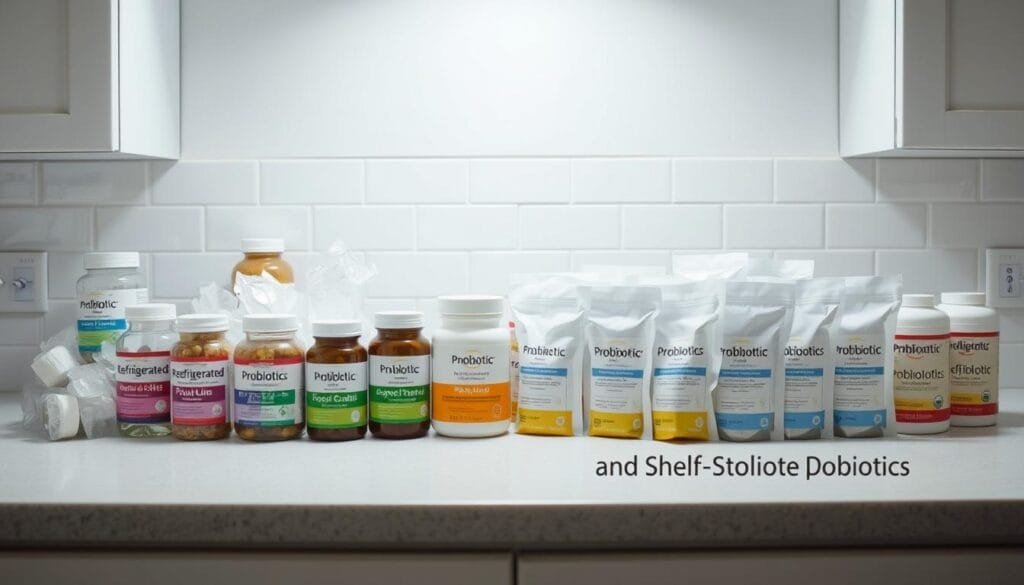Currently Empty: RM0.00
Those tiny live cultures in your supplements work hard to support digestion and immunity. But like delicate plants, they need the right environment to thrive. Wellness Concept, a trusted authority on microbial health, shares science-backed guidance to protect your investment in these beneficial bacteria.
Temperature changes and humidity act like silent thieves, stealing potency from unprotected formulas. Refrigerated options demand consistent cooling, while shelf-stable varieties use advanced protections like Activ-Vial™ technology. Knowing which type you have makes all the difference.
Proper care starts at purchase. Check labels for storage instructions specific to your product. Keep containers tightly sealed and away from steamy bathrooms or sunlit windowsills. When in doubt, Wellness Concept’s experts recommend erring on the side of caution – contact their team for personalized advice.
Key Takeaways
- Live cultures require specific conditions to remain active and effective
- Heat and moisture exposure can rapidly degrade product quality
- Storage needs vary between refrigerated and room-temperature formulas
- Innovative packaging extends viability without refrigeration
- Always follow manufacturer guidelines for optimal results
- Expert consultations ensure tailored solutions for your climate
Understanding Probiotics and Their Health Benefits
Within your body exists a bustling community of microscopic allies working daily to maintain your well-being. These live microorganisms form a vital partnership with your systems, offering support far beyond basic digestion.
What Are Probiotics?
Probiotics are living organisms naturally present in fermented foods and dietary supplements. Unlike harmful bacteria, these beneficial strains actively:
- Strengthen intestinal barriers against pathogens
- Produce essential vitamins like B12 and K2
- Break down complex carbohydrates for better nutrient absorption

Role of Probiotics in Gut Health
Your gut contains over 40 trillion microorganisms forming a delicate ecosystem. Research indicates specific bacterial strains help:
- Reduce bloating and irregular bowel movements
- Enhance immune response through gut-immune axis communication
- Maintain optimal pH levels to discourage harmful organism growth
Emerging studies reveal connections between balanced gut flora and improved mental clarity. While individual results vary, maintaining microbial diversity shows promise for whole-body wellness.
Essential Guide on How to Store Probiotics Properly
Keeping live cultures active requires precision. Even small environmental changes can turn beneficial bacteria into ineffective powder. Let’s explore the science behind maintaining microbial vitality.
Temperature and Moisture Considerations
Heat acts like a silent saboteur for delicate microorganisms. Refrigerated strains thrive between 4°C and 8°C – roughly your fridge’s middle shelf temperature. Room-temperature formulas withstand up to 25°C if shielded from humidity.
Moisture triggers premature activation. Desiccant-lined containers combat this by absorbing stray water molecules. Always reseal bottles immediately after use.
Refrigerated Versus Shelf-Stable Options
Traditional formulas demand consistent cooling. Modern solutions like Activ-Vial™ technology use triple-layer protection:
- Oxygen-absorbing caps
- Moisture-locking desiccants
- Light-blocking materials
These innovations let certain strains survive tropical climates without refrigeration.
Interpreting Storage Labels
Decoding instructions prevents costly mistakes. Look for these phrases:
“Refrigerate between 2°C–8°C” – needs constant cooling
“Store below 25°C” – stable at room temperature
Avoid placing products near ovens or windows. Malaysian humidity demands extra vigilance with non-refrigerated options.
Comparing Refrigerated and Shelf-Stable Probiotic Options
Choosing between cooling requirements and convenience doesn’t have to be confusing. Both approaches protect live cultures effectively when handled correctly.

Advantages and Limitations of Refrigeration
Refrigerated formulas remain the gold standard for delicate strains. These products maintain stable environments between 2°C–8°C, preserving viability for heat-sensitive cultures. Ideal for Malaysian households with consistent cooling access, they suit long-term storage needs.
Limitations emerge during travel or power outages. Brief exposure to room temperature won’t ruin them, but repeated temperature swings reduce effectiveness.
Innovative Shelf-Stable Technologies
Modern solutions eliminate dependency on appliances. Activ-Vial™ packaging combines three protective layers developed through 30 years of research:
- Oxygen-blocking caps
- Humidity-controlling desiccants
- UV-resistant materials
These advancements let probiotic supplements survive tropical climates without refrigeration. For office workers or frequent travelers, shelf-stable options prevent logistical headaches.
Experts suggest matching your choice to daily routines. Those in air-conditioned spaces might prefer traditional cooling methods. Active individuals often benefit from portable formats. Both approaches deliver results when storage guidelines get followed precisely.
Practical Tips and Expert Advice from Wellness Concept
Ever opened a supplement bottle wondering if your efforts truly pay off? Small daily habits determine whether those live cultures stay vigorous or fade away. Follow these science-backed strategies to maintain potency from first use to final capsule.
Maximizing Probiotic Shelf Life with Best Practices
Original packaging matters more than you think. Manufacturers design bottles with protective layers to block humidity and oxygen. Transferring capsules to weekly organizers exposes them to damaging elements. Keep products sealed tight between uses.
| Practice | Benefit | Impact |
|---|---|---|
| Use original containers | Blocks 85% more moisture | Extends viability by 3-6 months |
| Avoid cars/bathrooms | Prevents temperature spikes | Maintains 90% CFU count |
| Check expiration dates | Ensures minimum 10B CFU | Guarantees labeled potency |
| Pair with fermented foods | Boosts bacterial diversity | Enhances gut environment |
Heat-sensitive formulas lose half their potency after six hours in a hot car. Store bottles in kitchen pantries or bedroom drawers instead. For extra protection, place containers in airtight jars with silica packets.
Fermented foods like kimchi and yogurt complement probiotic supplements beautifully. Their natural acidity creates ideal conditions for microbial growth. Consume them within two weeks of opening for peak freshness.
Wellness Concept Contact Info and Business Hours
Need tailored solutions for Malaysia’s tropical climate? Reach out through these channels:
- WhatsApp: +60123822655
- Operating Hours:
Mon-Fri: 9:30 AM – 6:30 PM
Sat-Sun: 10 AM – 5 PM
Their team helps select products matching your lifestyle and storage capabilities. Whether you’re managing digestive concerns or boosting immunity, expert guidance ensures optimal results.
Conclusion
Your probiotic’s effectiveness depends on smart care from bottle to body. Live microorganisms thrive when shielded from heat spikes and humidity. Whether requiring refrigeration or designed for room temperature, each product’s success lies in respecting its unique needs.
Match your choice to daily routines – shelf-stable options suit active lifestyles, while refrigerated formulas excel in climate-controlled homes. Always check expiration dates and follow label instructions precisely. Modern packaging innovations help maintain bacterial stability, but consistency remains key.
Wellness Concept’s research confirms that well-preserved supplements deliver maximum health benefits. For personalized advice on strains and storage solutions in Malaysia’s tropical climate, their team stands ready to help protect your gut’s microscopic allies.
FAQ
Do all probiotics require refrigeration?
Not all strains need refrigeration. Shelf-stable options use advanced technologies to survive room temperatures. Always check labels for storage instructions, as requirements vary by product.
How does humidity affect probiotic quality?
Moisture can degrade live microorganisms in supplements. Storing them in cool, dry environments—like airtight containers or original packaging—helps maintain potency and extends shelf life.
Can expired probiotics still offer health benefits?
Expired products may lose bacterial viability. While not harmful, their effectiveness diminishes over time. Experts recommend replacing supplements before the expiration date for optimal gut support.
Are fermented foods a reliable alternative to supplements?
Foods like yogurt or kimchi contain natural probiotics but often lack specific strains found in supplements. For targeted benefits, combining both sources can enhance digestive health.
What storage mistakes shorten probiotic shelf life?
Exposure to heat, light, or humidity accelerates bacterial death. Leaving capsules in bathrooms or near stoves creates unstable conditions. Refrigeration is ideal for heat-sensitive strains.
How can I verify if my probiotics are still active?
Some brands list colony-forming units (CFUs) at expiration, not manufacture. For clarity, contact manufacturers directly. Wellness Concept provides batch-specific details via WhatsApp at +60123822655.


